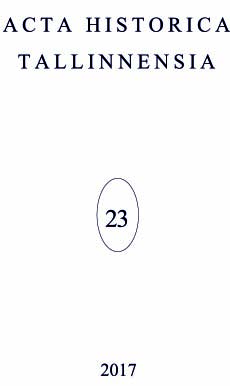VEERAND SAJANDIT KÜLMUTATUD KONFLIKTI. GRUUSIA-ABHAASIA SUHTED JA ABHAASIA PÜÜDLUSED RAHVUSVAHELISELE TUNNUSTATUSELE
A QUARTER OF A CENTURY OF FROZEN CONFLICT. GEORGIAN–ABKHAZ RELATIONS AND THE ASPIRATIONS OF THE REPUBLIC OF ABKHAZIA TOWARDS INTERNATIONAL RECOGNITION
Author(s): Aivar JürgensonSubject(s): History, Political history, Transformation Period (1990 - 2010)
Published by: Teaduste Akadeemia Kirjastus
Summary/Abstract: The article discusses the course of the Georgian–Abkhaz political conflict and the efforts to solve it after the end of the Georgian–Abkhaz war in 1993. As a result of the war Abkhazia was de facto separated from Georgia. With the secession Georgia lost 65–67% of its maritime border and 13% of its territory. The war killed tens of thousands of people, during and after the war the majority of the Georgian population of Abkhazia left this country. In Estonia, as well as in most Western countries, circulates the Georgian version of this conflict. The aim of this article is to give new aspects to the conflict discourse and to show the motives of the political agenda of the Abkhazian elite. While during the Georgian–Abkhaz war 1992–1993, the Estonian press showed impartiality to both parties of the conflict, later, when Georgia’s relations with Russia deteriorated, it clearly began to support Georgia. This support peaked during the Russian–Georgian war in August 2008 and remained broadly at the same level for a long time. Russia was perceived as a common enemy and this perception unites psychologically the countries that are located far from each other: ‘my enemy’s enemy is my friend’. Georgia was affectionately called in Estonia even our ‘neighbouring country’.When the Georgian–Abkhaz war in 1992–1993 and the frozen conflict after that showed that the actual aggressor was Georgia, this knowledge, if it exists at all, has been overshadowed by the positive image of Georgia in Estonia.In the public opinion of Estonia, the Georgian–Abkhaz conflict has received very little attention, but it is the same in most Western countries. The Georgian–Abkhaz war is elsewhere spoken of as the ‘forgotten war’, the post-war conflict of both countries is known as the ‘forgotten conflict’ or ‘frozen conflict’. Georgia stresses, when speaking about Abkhazia, the concept of Georgia’s territorial integrity. Here the majority of the world’s countries, including the Member States of the European Union, are loyal to Georgia’s demands. This article shows how the efforts of Estonian entrepreneurs to do business in Abkhazia have become extinct as a result of political pressure.After the end of the war, Georgia has tried to get Abkhazia back by various ways: in the framework of the economic sanctions on the Commonwealth of Independent States (CIS), supporting the operating Georgian guerrilla units in Georgian–Abkhaz border areas, seeking support from the West. After Georgia left the CIS in 2008, lobbying in the West has continued. The article discusses also the topic of the so-called Georgian refugees – former inhabitants of Abkhazia with Georgian ethnic background who left Abkhazia during the war and after that. Georgia’s condition to continue the negotiations with Abkhazia is the permission to remigrate the Georgians into Abkhazia. Abkhazia has agreed with remigration only partially, for both political and demographic reasons. The article also looks at Abkhazian political relations with Russia, Turkey and Europe (West). It is shown that in Abkhazia there are forces that would like to develop relations with the West to a much greater extent than it is possible today because of the opposition of Georgia. Finally, we will discuss Abkhazian demographic situation and the country’s efforts to improve it.The article concludes with the idea that Abkhazia is the only place in the world where Abkhazians could survive as a nation and preserve their unique language and culture. This is exactly what the Abkhazians need for their independent and internationally recognized state.
Journal: Acta Historica Tallinnensia
- Issue Year: 2017
- Issue No: 23
- Page Range: 113-145
- Page Count: 33
- Language: Estonian

